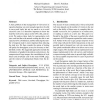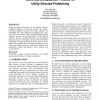57 search results - page 3 / 12 » Expected Utility of Content Blocks in Web Content Extraction |
SYSTOR
2010
ACM
13 years 8 months ago
2010
ACM
A basic problem in the management of web servers is capacity planning: you want enough capacity to be able to serve peak loads, but not too much so as to avoid excessive costs. It...
SMC
2010
IEEE
13 years 6 months ago
2010
IEEE
—Deep Web contents are accessed by queries submitted to Web databases and the returned data records are enwrapped in dynamically generated Web pages (they will be called deep Web...
CIKM
1998
Springer
13 years 12 months ago
1998
Springer
People accessing documents via the Internet typically experience latencies in retrieving content. We discuss continual-computation policies that dictate strategies for prefetching...
JUCS
2007
13 years 7 months ago
2007
: Creation of rich, ontology-based metadata is one of the major challenges in developing the Semantic Web. Emerging applications utilizing semantic web techniques, such as semantic...
PKDD
2007
Springer
14 years 1 months ago
2007
Springer
Detection of template and noise blocks in web pages is an important step in improving the performance of information retrieval and content extraction. Of the many approaches propos...


